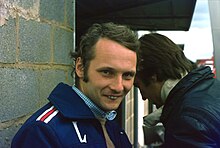

The 1976 Formula One season was the 30th season of FIA Formula One motor racing. It featured the 1976 World Championship of Drivers[1] and the 1976 International Cup for Formula 1 Manufacturers.[2] The two titles were contested over a sixteen race series which commenced on 25 January and ended on 24 October.[3] Two non-championship races were also held during the 1976 season. In an extraordinarily political and dramatic season, the Drivers' Championship went to McLaren driver James Hunt by one point from Ferrari's defending champion Niki Lauda, although Ferrari took the Manufacturers' trophy.
The controversy began in Spain where Hunt was initially disqualified from first place, handing the race win to Lauda, only for the decision to be overturned on appeal months later. Ferrari did not enter the Austrian Grand Prix out of protest.[4] Hunt won in France and, it seemed, in Britain, but the race had been restarted after a first lap pile-up and Hunt drove on an access road returning to the pits, which was against the rules. He was eventually disqualified after an appeal from Ferrari. Lauda became the official race winner. Lauda had a massive crash at the Nürburgring in West Germany and appeared likely to die from his injuries, but managed to return after missing just two races. Going into the final race in Japan, Lauda led Hunt by three points. In the appalling weather conditions, Lauda withdrew from the race and Hunt finished third to take the championship trophy. This was the last championship for a British driver until Nigel Mansell in 1992. The 2013 film Rush is based on this season, focusing on the rivalry and friendship between Hunt and Lauda.
Other noteworthy events include the introduction of the six-wheeled Tyrrell P34, the last race by Chris Amon, regarded as one of the best F1 drivers never to win a championship, and the British Grand Prix, for being the only championship race ever in which more than one female driver were entered (although both failed to qualify).
- ^ World Championship of Drivers, FIA Yearbook of Automobile Sport 1976, Orange section, pages 17 to 21
- ^ International Cup for Formula 1 Manufacturers, FIA Yearbook of Automobile Sport 1976, Orange section, page 21
- ^ "1976 RACE RESULTS". www.formula1.com. Archived from the original on 17 November 2020. Retrieved 29 November 2020.
- ^ Hope-Frost, Henry. "Top 12: Ferrari‑free Grands Prix". www.goodwood.com. Archived from the original on 7 February 2024. Retrieved 25 October 2023.